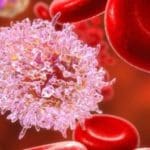Topic: Cancer treatment
Dr Klaartje Somers from Children’s Cancer Institute and Dr Deborah Meyran from Peter MacCallum Cancer Centre, along with their teams, are investigating ways to overcome the challenges of treating solid tumours with CAR T-cell immunotherapy

Recent research has found that androgens (such as testosterone) can activate an important anti-cancer immune response in prostate cancer cells.

A/Professor Croucher and his team are investigating new treatment options for triple-negative breast cancers that have spread.

Dr Wang will investigate and detail how leukaemic stem cells are able to survive and renew.

A/Professor Ziegler will test if a new drug combination can switch off the overactive molecular pathway and halt cancer progression in the most aggressive childhood brain tumours.

A/Professor Wang and her team will develop a test to monitor treatment response and watch for the early signs of treatment failure.

Dr Blancafort and her team will develop a test to detect a gene prolific in aggressive forms of breast cancer and identify new treatment targets.

Prof Price is investigating how new imaging technology could be used to enhance radiotherapy effectiveness in solid cancers.

A/Prof Griffin will conduct pre-clinical tests of a much needed new combination treatment for patients with advanced pancreatic and bowel cancers.
